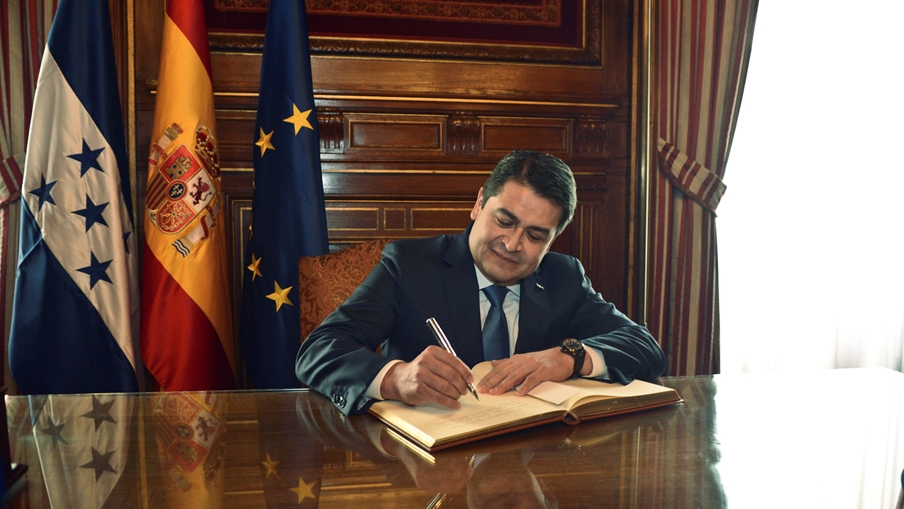A Honduran man was arrested Sunday on U.S. allegations that he, among other things, had bribed a co-conspirator identified in court records as the country’s president.
Geovanny Fuentes Ramirez was detained at Miami International Airport by agents of the Drug Enforcement Administration (DEA), prosecutors announced Tuesday. He was charged in a three-count complaint with drug trafficking and weapons offenses involving the use and possession of machine guns.
“Fuentes Ramirez was, up until his arrest by the DEA … a prolific, powerful and murderous cocaine trafficker in Honduras,” said Manhattan U.S. Attorney Geoffrey Berman. He was transferred to New York custody following a detention hearing in Miami on Wednesday morning, according to the court docket.
The case against Fuentes Ramirez is part of a larger probe of Honduran drug trafficking that has led to the conviction of former Honduran lawmaker Juan Antonio Hernandez Alvarado, who is the younger brother of Honduran President Juan Orlando Hernandez. The younger brother, who is known as “Tony Hernandez,” is scheduled to be sentenced in April, prosecutors said.
Tony Hernandez had formed relationships with drug traffickers, including the Los Valles Drug Trafficking Organization (Los Valles DTO) and Los Cachiros, as early as 2004, Kharon reported in September 2019. Fuentes Ramirez and Tony Hernandez were associates since at least 2012, a Honduran military intelligence official told InSight Crime, an organization that studies organized crime in Latin America. Fuentes Ramirez also had relationships with several Honduran politicians and officials, a retired police chief said to InSight Crime.
Honduran territory is exploited by drug traffickers who transit cocaine destined for the U.S., the State Department said in the latest edition of its International Narcotics Control Strategy Report, which was publicly released on Monday. About 4 percent of cocaine shipments from South America made a first stop by air or by sea in Honduras in 2019, and more is believed to have transited through by land, the report said.
The U.S. has recently stepped up its investigations of drug trafficking through the country, and has used sanctions and prosecutions in its efforts. The Honduran leader, who vehemently denied wrongdoing amid his brother’s trial, has been identified in court records in the latest case as “CC-4.” He was similarly labeled as CC-4 in court records in the Tony Hernandez case.
Prosecutors said Tuesday that Fuentes Ramirez paid CC-4 a USD 25,000 bribe in 2013 for protection after a raid by Honduran law enforcement on his cocaine laboratory.
The Honduran presidency rejected the latest claims following reports on the arrest of Fuentes Ramirez, saying on social media that the new allegation “is 100% false” and apparently “based on lies from confessed criminals seeking revenge” or to shorten their prison sentences.
The lab, established in 2009, produced hundreds of kilograms of cocaine per month, according to prosecutors. And Fuentes and others used a clandestine airstrip to receive shipments and transport cocaine he produced, prosecutors said. To protect the lab and his drug trafficking activity, Fuentes Ramirez used violence, including the murder of a law enforcement official who he believed was investigating the lab, and bribery of Honduran public officials, prosecutors said.
Around the time of the bribe, CC-4 expressed interest in access to the lab because of its proximity to a major shipping port and agreed to help with acquiring Honduran armed forces personnel as security for Fuentes Ramirez’s activities, according to prosecutors. CC-4 instructed Fuentes Ramirez to report to Tony Hernandez for future drug trafficking activity, according to prosecutors.
